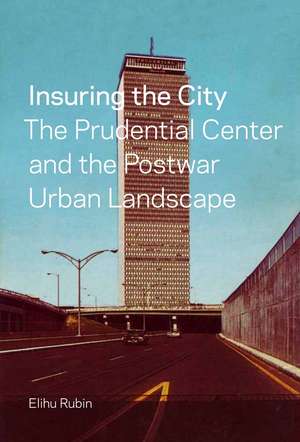Insuring the City: The Prudential Center and the Postwar Urban Landscape
Autor Elihu Rubinen Limba Engleză Paperback – sep 2024
The Prudential Center anchors the Boston skyline with its tall, gray tower. It is also a historical beacon, representing a midcentury moment when insurance companies such as Prudential were particularly aware of how their physical presence and civic engagement reflected upon their intangible product: financial security.
Looking to New York’s Rockefeller Center, the creators of the Prudential Center aspired to use real estate development as a tool toward civic achievement, reinvigorating central Boston and integrating a large complex of buildings with new infrastructure for the automobile. Now available in paperback, this award-winning book tells the full story of “The Pru,” placing it in the political, economic, and architectural contexts of the period, and providing new insights into urban renewal in postwar America.
Preț: 295.84 lei
Nou
Puncte Express: 444
Preț estimativ în valută:
56.61€ • 59.10$ • 46.85£
56.61€ • 59.10$ • 46.85£
Carte tipărită la comandă
Livrare economică 04-18 aprilie
Preluare comenzi: 021 569.72.76
Specificații
ISBN-13: 9780300280821
ISBN-10: 0300280823
Pagini: 264
Ilustrații: 52 b-w illlus.
Dimensiuni: 152 x 229 mm
Greutate: 0.36 kg
Editura: Yale University Press
Colecția Yale University Press
ISBN-10: 0300280823
Pagini: 264
Ilustrații: 52 b-w illlus.
Dimensiuni: 152 x 229 mm
Greutate: 0.36 kg
Editura: Yale University Press
Colecția Yale University Press
Recenzii
“A much-needed account of an important early example of public–private partnerships in urban development. . . . Well written, [with] a compelling storyline.”—James Michael Buckley, Buildings & Landscapes
“A refreshingly evenhanded assessment of one of Boston’s most conspicuous renewal projects. . . . Historians of all types would do well to follow Rubin’s example in recognizing the honest purposes of their forebears.”—Brian M. Sirman, CAA Reviews
“Rubin never strays from the larger question of the turbulent public-private alliance that brought ‘the Pru’ into existence. . . . [He] masterfully and captivatingly spins the story of Prudential’s own internal struggles to act as an agent of urban renewal while at the same time staying true to the company’s bottom line.”—Noah Chasin, Journal of the Society of Architectural Historians
Winner of the 2013 Lewis Mumford Prize from the Society for American City and Regional Planning History
Winner of the Urban History Association’s Kenneth Jackson Award for Best Book in North American Urban History, 2012
Honorable Mention in the General Non-Fiction category at the 2012 New England Book Festival
“More than the story of a single project, Insuring the City is a thoroughly engaging account of the evolving relationships between cities and suburbs, downtowns and midtowns, architecture and business, public policy and private interests, and development politics and visual culture.”—Lawrence J. Vale, MIT, author of Architecture, Power, and National Identity
“A very valuable book, one that will be essential reading for scholars concerned with the twentieth-century city and its architecture.”—Richard Longstreth
“You don’t have to be from Boston to admire Insuring the City. Elihu Rubin returns a long overlooked player—corporate America—to the story of urban renewal and reminds us in particular how crucial insurance companies were to the creation of the postindustrial city. This is a handsome and important book.”—Lizabeth Cohen, author of A Consumers’ Republic: The Politics of Mass Consumption in Postwar America
“Fascinating. . . . Rubin offers a surprisingly broad reinterpretation of urban renewal in the automobile age . . . treat[ing] corporate decision makers seriously as shapers of the postwar city.”—Urban History Association
“A refreshingly evenhanded assessment of one of Boston’s most conspicuous renewal projects. . . . Historians of all types would do well to follow Rubin’s example in recognizing the honest purposes of their forebears.”—Brian M. Sirman, CAA Reviews
“Rubin never strays from the larger question of the turbulent public-private alliance that brought ‘the Pru’ into existence. . . . [He] masterfully and captivatingly spins the story of Prudential’s own internal struggles to act as an agent of urban renewal while at the same time staying true to the company’s bottom line.”—Noah Chasin, Journal of the Society of Architectural Historians
Winner of the 2013 Lewis Mumford Prize from the Society for American City and Regional Planning History
Winner of the Urban History Association’s Kenneth Jackson Award for Best Book in North American Urban History, 2012
Honorable Mention in the General Non-Fiction category at the 2012 New England Book Festival
“More than the story of a single project, Insuring the City is a thoroughly engaging account of the evolving relationships between cities and suburbs, downtowns and midtowns, architecture and business, public policy and private interests, and development politics and visual culture.”—Lawrence J. Vale, MIT, author of Architecture, Power, and National Identity
“A very valuable book, one that will be essential reading for scholars concerned with the twentieth-century city and its architecture.”—Richard Longstreth
“You don’t have to be from Boston to admire Insuring the City. Elihu Rubin returns a long overlooked player—corporate America—to the story of urban renewal and reminds us in particular how crucial insurance companies were to the creation of the postindustrial city. This is a handsome and important book.”—Lizabeth Cohen, author of A Consumers’ Republic: The Politics of Mass Consumption in Postwar America
“Fascinating. . . . Rubin offers a surprisingly broad reinterpretation of urban renewal in the automobile age . . . treat[ing] corporate decision makers seriously as shapers of the postwar city.”—Urban History Association
Notă biografică
Elihu Rubin is the Henry Hart Rice Associate Professor of Architecture and Urban Studies at Yale University.
Descriere
An in-depth look at Boston’s Prudential Center and what its story reveals about the evolution of the modern American city
